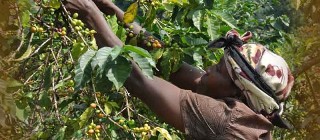Nespresso halts coffee operations in S. Sudan
October 9, 2016 (JUBA) – The Swiss-based coffee maker Nespresso has announced a temporary halt in coffee operations in war-torn South Sudan.

“The situation has deteriorated and is very difficult at the moment,” she added.
The U.S. aid arm (USAID) has injected $3.18 million over the next three years to train smallholder farmers to boost production in South Sudan’s coffee sector. The funding is reportedly part of a public-private partnership with Nespresso and international development consultancy TechnoServe.
Last year, Nespresso shipped its first volumes of coffee production from South Sudan, marking the first non-oil exports out of the country in over a generation.
Since it started revive coffee production in the war-torn nation in 2011, around 1,000 smallholder farmers have reportedly been trained in agribusiness techniques and about three-quarters of them now commercially-engaged.
At least six coffee cooperatives have since been established, in addition to having in place the first wet mill processing unit in the world’s youngest nation.
According to Nespresso, the company’s investment of over US$ 2.5 million in reviving the production of high-quality South Sudanese coffee since 2011 demonstrates the potential for commercial coffee production in the country.
As part of the expansion of its sustainably quality program in Africa, Nespresso says it aims to ensure it has invested over US$ 3.4 million in the project by end of 2016.
Although South Sudan has vast and largely untapped natural resources, beyond a few oil enclaves, it remains relatively undeveloped, characterized by a subsistence economy. South Sudan is the most oil-dependent country in the world, with oil accounting for almost the totality of exports, and around 60% of its gross domestic product. On current reserve estimates, oil production is expected to reduce steadily in future years and become negligible by 2035.
According to the World Bank, livelihoods in South Sudan are mainly concentrated in low productive, unpaid agriculture and pastoralists work, accounting for around 15% of GDP.
“In fact 85% of the working population in South Sudan is engaged in non-wage work, chiefly in agriculture,” it says.
The South Sudanese conflict had a significant financial impact on the country as increase in military expenditure greatly reduced availability of resources for service delivery and capital spending on the much-needed infrastructure.
According to South Sudan’s Petroleum ministry, oil prices decreased by 40% from $29.75 per barrel in December 2015 to $18 per barrel in January 2016. Production also significantly declined over the same period, cutting gross oil revenue by more than half from $29.7 million in December to $10.8 million in January.
The decline in oil revenue has reportedly also had a negative impact on macro-budgetary indicators, requiring austere fiscal adjustments in South Sudan’s economy.
Investing in coffee offers a unique chance to diversify South Sudan’s oil-dependent economy, build peace and offer a glimmer of hope for the country.
(ST)
